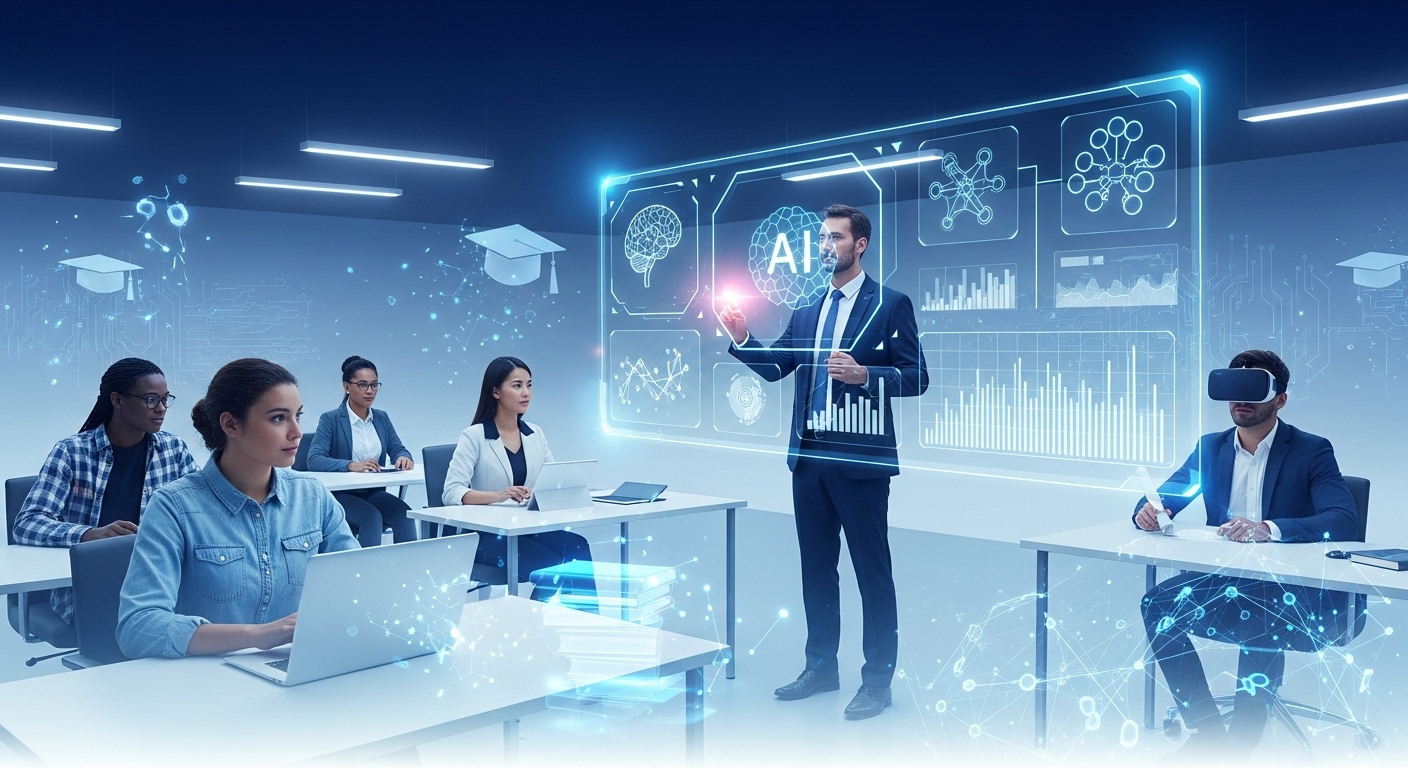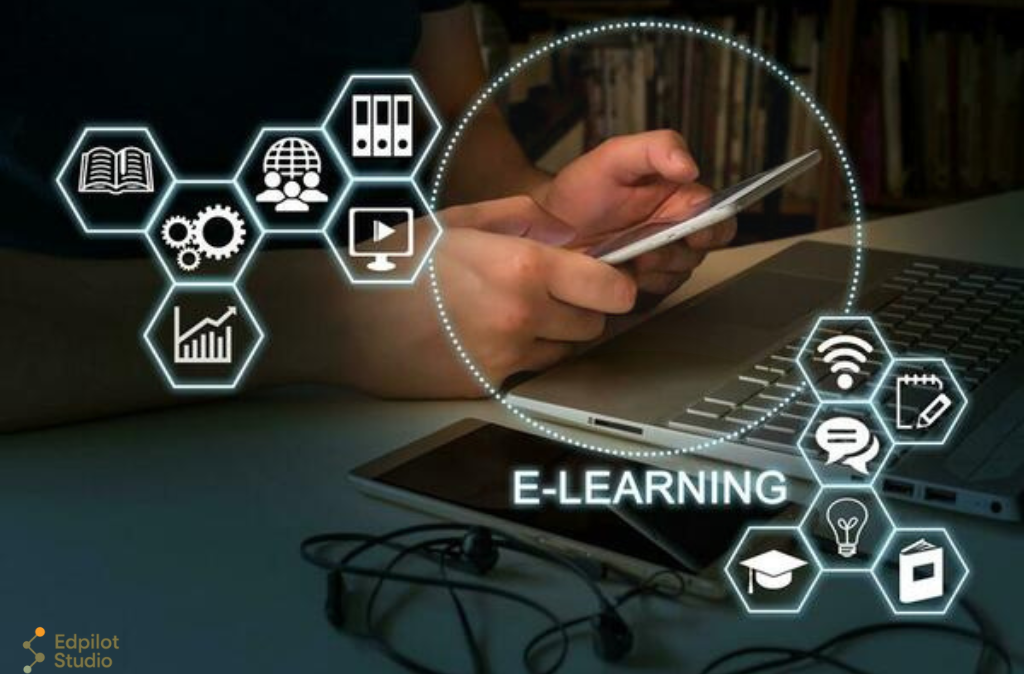Table of Contents
Key Benefits of AI for Institutions and Enterprises
Artificial Intelligence has moved beyond experimentation — it’s now a proven driver of efficiency, personalization, and performance in both educational and corporate environments. For decision-makers in institutions and enterprises, AI’s true value lies in how it converts massive data into actionable intelligence, automates time-consuming processes, and creates learning ecosystems that continually evolve.
Enhanced Personalization and Learner Experience
AI-powered learning management systems (LMS) enable hyper-personalized education. These systems track learner behavior, adapt content in real time, and provide unique learning paths for every individual. For institutions, this means each student gets targeted feedback and a curriculum suited to their pace and capability. For enterprises, AI ensures that every employee’s training aligns with their role, skill gaps, and growth goals.
By integrating adaptive learning and AI tutoring, organizations deliver interactive, engaging learning experiences that increase retention and satisfaction. The outcome is consistent skill development across departments, improved workforce agility, and better learning ROI.
Data-Driven Decisions and Performance Insights
AI transforms how educational data is used. Through AI analytics in education, institutions can monitor student performance trends, detect learning challenges early, and adjust instruction accordingly. Enterprises can use predictive learning models to identify high-performing teams or anticipate skill shortages, allowing proactive training investments.
This data-driven approach enables continuous improvement in content design, resource allocation, and strategic planning — ensuring every decision is supported by real insights rather than assumptions. Over time, these insights shape stronger academic results and higher operational efficiency.
Operational Efficiency and Cost Optimization
Automation is one of the strongest benefits of AI in education. AI systems can manage grading, attendance, scheduling, and performance evaluation with minimal human input. This drastically reduces the administrative load for educators and HR teams, freeing them to focus on mentoring and strategy.
Enterprises benefit from reduced training costs and faster course deployment, while institutions gain from streamlined management and enhanced resource utilization. The combination of AI education strategy and automation builds a scalable, cost-effective learning model that delivers measurable value over time.
AI is elevating the learning experience into a complete transformation of the education business, empowering institutions and enterprises to gain a decisive edge through smarter engagement, operational efficiency, and data-driven strategy. Institutions and enterprises adopting B2B AI education services are gaining a decisive competitive edge by improving learner engagement, operational agility, and strategic clarity.
Major Applications of AI in Education
Artificial Intelligence is redefining how learning content is created, delivered, and optimized. Its impact extends from classrooms to corporate training programs, bridging the gap between education and enterprise skill development. Below are the key applications transforming learning systems into adaptive, data-driven environments.
Intelligent Tutoring and Adaptive Learning
One of the most influential applications of AI in education is intelligent tutoring systems. These systems function as virtual mentors capable of assessing learner performance, identifying gaps, and delivering customized support 24/7.
For academic institutions, AI tutors can supplement instructors by providing one-on-one attention to every student — something previously limited by class size. In enterprise learning, custom AI tutor development enables automated onboarding, continuous upskilling, and personalized feedback loops for employees.
Adaptive learning powered by AI uses algorithms to modify difficulty levels, recommend resources, and adapt course flow dynamically. The result is a learning experience that evolves with the learner — improving both engagement and mastery.
Automated Evaluation and Grading Systems
AI-driven evaluation systems can analyze written answers, assignments, and assessments with remarkable accuracy. AI-powered assessment and grading systems reduce bias, increase consistency, and accelerate feedback.
In academic settings, these systems save faculty time while ensuring fair evaluation. For enterprises, automated grading allows HR and L&D teams to track training effectiveness in real time and measure ROI. Predictive learning models further identify learners at risk of underperformance, enabling early intervention and improved outcomes.
Personalized and Immersive Learning Experiences
Personalization is now a fundamental expectation in education, and AI delivers it seamlessly. AI-powered learning management systems recommend modules, microlearning units, or resources based on user preferences and behavior. Learners receive content tailored to their skill levels, interests, and professional goals.
For enterprises, personalization translates to higher productivity and skill alignment. Employees engage more when training feels relevant, actionable, and self-paced. For institutions, it supports inclusivity by catering to diverse learning styles and speeds.
By combining machine learning, natural language processing, and behavioral analytics, AI is transforming how knowledge is delivered — turning static learning environments into adaptive, interactive ecosystems that continuously improve.
The convergence of intelligent tutoring, adaptive content, and automated evaluation demonstrates how AI in education empowers organizations to deliver scalable, measurable, and high-quality learning experiences across every level of education and enterprise training.
Industry Trends & Global Statistics
Artificial Intelligence is now at the center of digital transformation in the education sector. From adaptive course design to enterprise skill mapping, the technology is evolving rapidly and reshaping how learning ecosystems function worldwide. For institutions and enterprises alike, keeping pace with these trends determines who leads in innovation and who follows.
Growth of AI Adoption in Global EdTech
The global market for AI in education continues to expand at an unprecedented rate. Recent data shows that the industry is growing at over 40% CAGR, driven by increasing demand for automation, personalization, and performance analytics. Educational institutions and corporate learning providers are actively investing in AI-powered education platforms to manage large-scale learning operations efficiently.
Universities use AI to analyze student progress, predict dropouts, and personalize course recommendations. Enterprises are adopting corporate AI training systems to align workforce development with organizational objectives. The outcome is a blended model where traditional learning and AI technology coexist to produce measurable impact.
Role of Generative AI in Content Creation
Generative AI in education is transforming how courses and training programs are designed. Platforms can now generate quizzes, lesson plans, and visual materials within seconds, saving time for educators and content teams. For businesses, generative AI streamlines corporate onboarding materials, compliance training, and microlearning content.
AI tools also personalize content tone and complexity for specific learners, whether a first-year college student or a senior professional upgrading technical skills. This democratization of content creation reduces dependency on manual design while ensuring consistency, accuracy, and engagement.
Predictive and Prescriptive Learning Models
Predictive analytics has become one of the strongest AI education trends of 2025. Institutions and enterprises use these models to forecast learning outcomes, detect disengagement, and identify opportunities for improvement before issues arise.
Enterprises are particularly leveraging data-driven education with AI to measure skill performance against business KPIs. These insights guide HR and L&D leaders in structuring training paths that enhance productivity and retention.
Meanwhile, AI analytics in education delivers prescriptive insights that go beyond surface-level reporting, offering clear, actionable guidance to enhance outcomes and optimize learning systems across every stage. This capability transforms decision-making from reactive to proactive, driving sustainable progress across the learning lifecycle.
The consistent growth of AI integration across EdTech and enterprise learning confirms a powerful reality — education has become dynamic and intelligent. Through automation, analytics, and adaptive systems, organizations implementing advanced AI education strategies are achieving long-term excellence in engagement, operational efficiency, and continuous innovation.
The Future of AI-Driven Education
The evolution of Artificial Intelligence in education is just beginning. As the boundaries between physical and digital learning environments blur, AI will continue to serve as the foundation for personalized, data-driven, and outcome-oriented education. Institutions and enterprises that adapt early will lead a new era of intelligent learning ecosystems designed for continuous growth.
Integration with Emerging Technologies
The next generation of learning will combine AI with immersive technologies like augmented reality (AR), virtual reality (VR), and mixed reality (MR). Imagine students exploring virtual laboratories guided by AI tutors or employees learning complex machinery through interactive simulations that adapt in real time.
This integration enhances engagement, retention, and real-world application. Intelligent education technology powered by AI can dynamically assess learner behavior, adjust virtual environments, and deliver an experience that’s both interactive and measurable. For enterprises, this means faster skill acquisition and reduced training costs — while institutions achieve deeper, experiential learning outcomes.
Human–AI Collaboration in Learning Ecosystems
The future of education will rely on collaboration between humans and AI, not competition. AI will handle automation, analytics, and adaptive delivery, while educators and trainers focus on emotional intelligence, creativity, and mentorship.
Instructors will evolve into learning strategists — designing frameworks that integrate AI-powered learning systems with human-led guidance. Enterprises will see training managers using AI dashboards to interpret insights, track engagement, and design more effective learning pathways. This synergy ensures that technology amplifies human expertise rather than replacing it.
Long-Term Value Creation for Institutions and Enterprises
AI’s ultimate contribution lies in sustainability and strategic growth. Through AI education software for organizations, institutions can predict enrollment trends, optimize resource allocation, and personalize academic support at scale. For enterprises, AI ensures continuous employee development aligned with evolving business needs.
The focus will shift from one-time training to lifelong learning ecosystems, where skills are updated seamlessly as industries evolve. Organizations adopting AI for skill development will create cultures of agility, ensuring competitiveness in every market condition.
By 2030, AI-driven education will stand as the global benchmark — seamlessly integrating learning, work, and innovation into a unified, intelligent ecosystem for institutions and enterprises worldwide.
As the technology matures, the line between education and enterprise learning will continue to fade. Institutions will operate like dynamic organizations, and businesses will function as ongoing learning hubs. The common foundation will be AI — a technology that transforms not only how people learn, but also how they think, grow, and achieve excellence.
Building a Smarter Learning Future
Artificial Intelligence is no longer an emerging concept; it is the foundation of modern education and enterprise learning. From automating evaluations to creating personalized, data-driven learning journeys, AI in education delivers measurable improvements in efficiency, engagement, and long-term growth. Institutions and enterprises that embrace this transformation now position themselves as innovators in a rapidly changing digital landscape.
The future of education is intelligent, interconnected, and outcome-oriented. For institutions, adopting AI-powered learning solutions means the ability to personalize education at scale, track student success with precision, and build a smarter academic ecosystem. For enterprises, it represents a shift from traditional training toward continuous, skill-focused learning that directly supports organizational performance.
Building a strategic AI education strategy for enterprises is not only about technology — it’s about reimagining how people learn and evolve. The organizations that integrate AI into their education models will lead the next wave of workforce development, producing professionals who are agile, creative, and future-ready.
This is the moment for education leaders, EdTech innovators, and corporate learning strategists to take the next step. Conduct an AI-readiness audit, explore enterprise AI adoption frameworks, and pilot AI learning modules within your systems. Each small implementation builds toward a larger transformation that drives measurable impact.
The journey toward a smarter learning future begins with one decision: to see education not just as information delivery, but as an intelligent ecosystem that grows with every learner. Artificial Intelligence makes that vision possible — empowering institutions and enterprises to shape the future of learning today.



